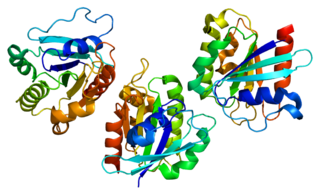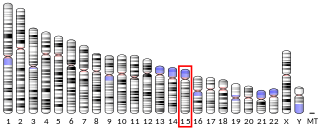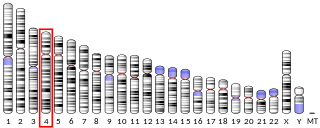Bardet–Biedl syndrome 7 is a protein that in humans is encoded by the BBS7 gene. [5]
Contents
Mutations in this gene are associated with the Bardet–Biedl syndrome. [5]
Bardet–Biedl syndrome 7 is a protein that in humans is encoded by the BBS7 gene. [5]
Mutations in this gene are associated with the Bardet–Biedl syndrome. [5]

Bardet–Biedl syndrome (BBS) is a ciliopathic human genetic disorder that produces many effects and affects many body systems. It is characterized by rod/cone dystrophy, polydactyly, central obesity, hypogonadism, and kidney dysfunction in some cases. Historically, slower mental processing has also been considered a principal symptom but is now not regarded as such.

Pericentriolar material 1, also known as PCM1, is a protein which in humans is encoded by the PCM1 gene.

Centrosomal protein of 290 kDa is a protein that in humans is encoded by the CEP290 gene. CEP290 is located on the Q arm of chromosome 12.

McKusick–Kaufman/Bardet–Biedl syndromes putative chaperonin is a protein that in humans is encoded by the MKKS gene.

Bardet–Biedl syndrome 1 protein is a protein that in humans is encoded by the BBS1 gene. BBS1 is part of the BBSome complex, which required for ciliogenesis. Mutations in this gene have been observed in patients with the major form of Bardet–Biedl syndrome.

Bardet–Biedl syndrome 5 protein is a protein that in humans is encoded by the BBS5 gene.

ADP-ribosylation factor-like protein 6 is a protein that in humans is encoded by the ARL6 gene.

Bardet–Biedl syndrome 2 protein is a protein that in humans is encoded by the BBS2 gene.

Bardet–Biedl syndrome 4 is a protein that in humans is encoded by the BBS4 gene.

Tripartite motif-containing protein 32 is a protein that in humans is encoded by the TRIM32 gene. Since its discovery in 1995, TRIM32 has been shown to be implicated in a number of diverse biological pathways.

ADP-ribosylation factor-like protein 4D is a protein that in humans is encoded by the ARL4D gene.

Coiled-coil domain-containing protein 28B is a protein that in humans is encoded by the CCDC28B gene.

Tetratricopeptide repeat domain 8 (TTC8) also known as Bardet–Biedl syndrome 8 is a protein that in humans is encoded by the TTC8 gene.

Bardet–Biedl syndrome 9 is a protein that in humans is encoded by the BBS9 gene.

Bardet–Biedl syndrome 10, also known as BBS10 is a human gene.

Bardet–Biedl syndrome 12 is a protein that in humans is encoded by the BBS12 gene.

Meckel syndrome, type 1 also known as MKS1 is a protein that in humans is encoded by the MKS1 gene.

Coiled-coil and C2 domain-containing protein 2A that in humans is encoded by the CC2D2A gene.

Transmembrane protein 216 is a protein in humans that is encoded by the TMEM216 gene.

ADP-ribosylation factor-like protein 13B (ARL13B), also known as ADP-ribosylation factor-like protein 2-like 1, is a protein that in humans is encoded by the ARL13B gene.